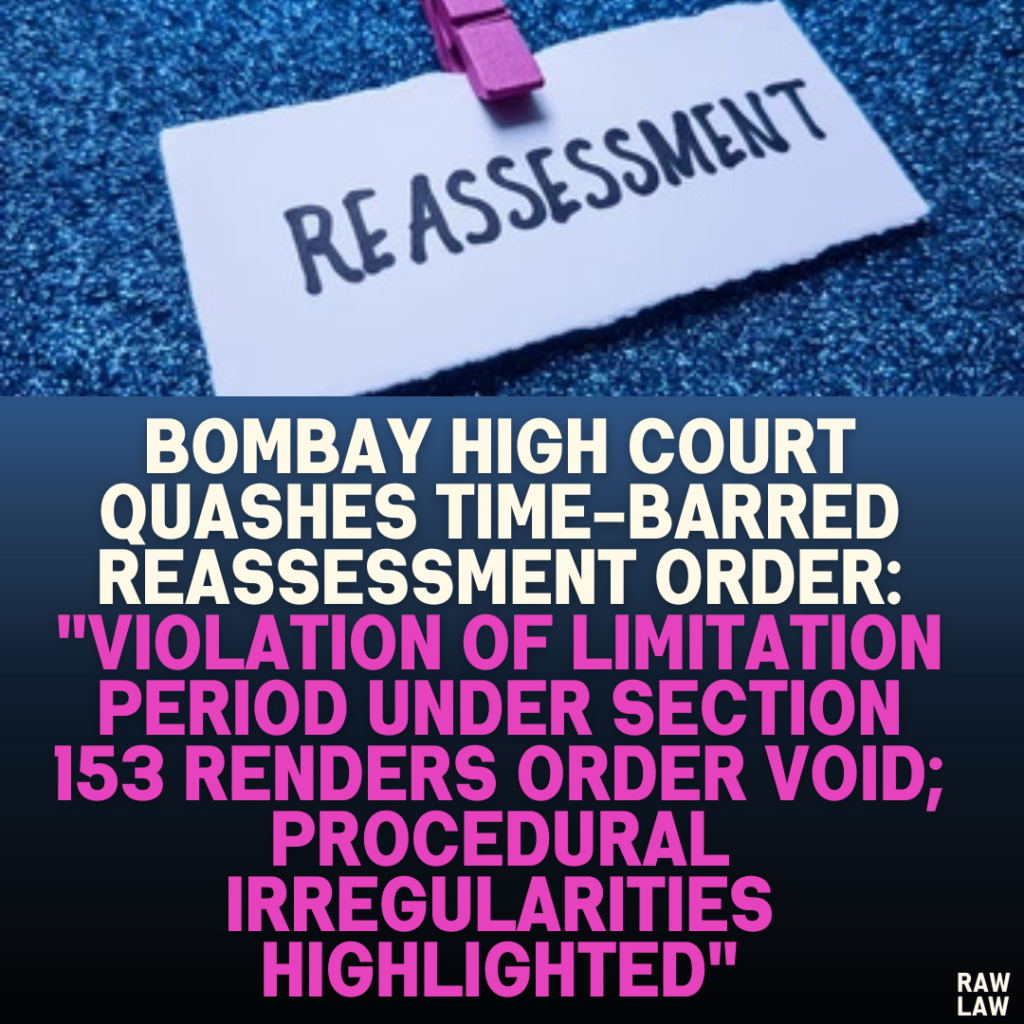Court’s Decision
The `Bombay High Court` quashed the reassessment order passed by the Income Tax Department under Section 143(3) read with Sections 147 and 144B of the Income Tax Act. It held that the order was barred by limitation, stating:
“When an assessment order is passed beyond the statutory period of limitation, it is void ab initio and without jurisdiction.”
The Court emphasized the importance of strict adherence to procedural timelines outlined in the Income Tax Act.
Facts
- Filing of Returns and Original Proceedings:
- The petitioner, an LLP, filed its income tax return for the assessment year (AY) 2012-13 on 29 September 2012.
- A notice under Section 148 was issued on 29 March 2019, alleging that the petitioner failed to disclose ₹4.13 crore in taxable income related to certain land transactions.
- Subsequent Objections and Judicial Stay:
- The petitioner objected to the reopening of assessment on the grounds that the reasons cited were vague and lacked legal basis.
- An interim stay on the reassessment proceedings was granted by the High Court on 13 December 2019 and remained in effect until 21 September 2021, when the Court remanded the matter back to the Assessing Officer for reconsideration.
- Reassessment Order Passed Late:
- Despite the Court’s direction, the reassessment order was issued on 30 September 2022, long after the statutory period for completing reassessment had expired.
Issues
- Was the reassessment order passed on 30 September 2022 barred by limitation under Section 153 of the Income Tax Act?
- Was the notice issued under Section 148 validly supported by the requisite approvals under Section 151?
Petitioner’s Arguments
- Time-Barred Reassessment:
- The petitioner argued that even after accounting for the exclusion of the stay period (from 13 December 2019 to 21 September 2021), the reassessment order exceeded the limitation period under Section 153(2).
- The original nine-month limitation period expired on 31 December 2019. Including the stay period, the final deadline was extended to 20 November 2021. Therefore, the reassessment order dated 30 September 2022 was invalid.
- Non-Furnishing of Approval:
- The petitioner contended that the approval required under Section 151 for issuing a notice under Section 148 was not provided, making the reassessment process procedurally defective.
- Violation of Natural Justice:
- The petitioner alleged procedural irregularities, including the lack of opportunity to effectively respond to notices issued during the reassessment proceedings.
Respondent’s Arguments
- Extension of Limitation Period:
- The Income Tax Department argued that the limitation period was extended under Section 153(6) because of the High Court’s order directing the reassessing officer to reconsider the objections.
- It was contended that the reassessment order passed on 30 September 2022 was within the extended time limits allowed by the Court’s directions.
- Compliance with Section 151:
- The Revenue maintained that all procedural requirements, including approval under Section 151, were followed, and the petitioner’s claims were baseless.
- No Prejudice Caused:
- The Revenue claimed that the petitioner was given sufficient opportunities to present its case and that the reassessment proceedings adhered to principles of natural justice.
Analysis of the Law
Section 153(2) of the Income Tax Act:
- No order of reassessment under Section 147 can be passed after nine months from the end of the financial year in which the notice under Section 148 is served.
- In this case:
- The notice was served on 29 March 2019.
- The financial year ended on 31 March 2019.
- The nine-month limitation expired on 31 December 2019.
Exclusion of Stay Period under Explanation 1(ii):
- Explanation 1(ii) allows the exclusion of the period during which reassessment proceedings are stayed by a court order.
- Here, the stay was in effect from 13 December 2019 to 21 September 2021, extending the deadline to 20 November 2021.
Proviso to Explanation 1:
- The proviso mandates that if, after excluding the stay period, the remaining time for reassessment is less than 60 days, the limitation period is extended to 60 days.
- Even considering this, the final deadline was 20 November 2021, beyond which the reassessment order was passed.
Section 153(6):
- This subsection provides an extended limitation of 12 months for reassessment if it is to give effect to a court order containing specific directions.
- The Court observed that its earlier order contained no such direction to extend the reassessment period.
Precedent Analysis
- Rajinder Nath v. CIT (SC):
- Held that limitation provisions under the Income Tax Act must be strictly construed.
- ITO v. Murlidhar Bhagwan Das (SC):
- Highlighted that orders passed beyond the statutory limitation period are void and without jurisdiction.
- Tally India Pvt. Ltd. (Karnataka HC):
- Reiterated that reassessment proceedings initiated or completed after the statutory period of limitation are invalid.
Court’s Reasoning
- The reassessment order violated the limitation provisions of Section 153(2), even after excluding the stay period.
- The High Court’s earlier order remanding the matter to the assessing officer did not extend the reassessment period under Section 153(6).
- The failure to furnish approval under Section 151 further invalidated the reassessment process.
Conclusion
The Court quashed the reassessment order, holding it to be:
- Barred by Limitation: The order was passed beyond the statutory deadline.
- Procedurally Defective: Approval under Section 151 was not furnished to the petitioner, violating principles of natural justice.
Implications
This judgment reinforces:
- Strict Compliance with Limitation Provisions: Tax authorities must adhere to statutory timelines to avoid invalidation of reassessment orders.
- Procedural Transparency: The Income Tax Department must ensure approvals and reasons are communicated to taxpayers to uphold principles of natural justice.
- Judicial Safeguards: Taxpayers can rely on courts to protect their rights against arbitrary or time-barred reassessments.



